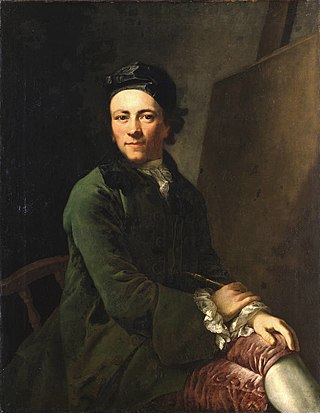Related Research Articles

Gotthold Ephraim Lessing was a German philosopher, dramatist, publicist and art critic, and a representative of the Enlightenment era. His plays and theoretical writings substantially influenced the development of German literature. He is widely considered by theatre historians to be the first dramaturg in his role at Abel Seyler's Hamburg National Theatre.

The Bach family refers to several notable composers of the baroque and classical periods of music, the best-known of whom was Johann Sebastian Bach (1685–1750). A family genealogy was drawn up by Johann Sebastian Bach himself in 1735 when he was 50 and was completed by his son Carl Philipp Emanuel.

Anton Graff was an eminent Swiss portrait artist. Among his famous subjects were Friedrich Schiller, Christoph Willibald Gluck, Heinrich von Kleist, Frederick the Great, Friederike Sophie Seyler, Johann Gottfried Herder, Gotthold Ephraim Lessing, Moses Mendelssohn and Christian Felix Weiße. His pupils included Emma Körner, Philipp Otto Runge and Karl Ludwig Kaaz.
The Vossische Zeitung was a nationally known Berlin newspaper that represented the interests of the liberal middle class. It was also generally regarded as Germany's national newspaper of record. In the Berlin press it held a special role due to the fact that by way of its direct predecessors it was the oldest newspaper in the city. The name went back to Christian Friedrich Voss, who was its owner from 1751 to 1795, but Vossische Zeitung became its official name only after 1911. It ceased publication in 1934 under pressure from the Nazi state.

Karl Friedrich Lessing was a German historical and landscape painter, grandnephew of Gotthold Ephraim Lessing and one of the main exponents of the Düsseldorf school of painting.
Christian Friedrich Lessing was a German botanist who was a native of Groß Wartenberg, Niederschlesien. He was a brother to painter Carl Friedrich Lessing (1808–1880), and a grandnephew of poet Gotthold Ephraim Lessing (1729–1781).

The Alter Südfriedhof also known as "Alter Südlicher Friedhof" is a cemetery in Munich, Germany. It was founded by Duke Albrecht V as a plague cemetery in 1563 about half a kilometer south of the Sendlinger Gate between Thalkirchner and Pestalozzistraße.
Gotthold is a name of German origin. People with the name include:

Otto Lessing was a prominent German Historicist sculptor whose work largely shaped the appearance of Berlin in the late 19th and early 20th centuries. He was the son of history and landscape painter Carl Friedrich Lessing and the great great nephew of poet Gotthold Ephraim Lessing.

Anna Rosina de Gasc was a German portrait painter.
1781 in philosophy

The Wilhelm-Ernst-Gymnasium is a secondary school on Herderplatz 14 in Weimar, Germany. Founded in 1712 by Duke William Ernest of Saxe-Weimar, it is the oldest school building in the city. Numerous notable figures such as Johann Gottfried Herder, Johann Heinrich Voss, Friedrich Wilhelm Riemer and Johann Karl August Musäus studied here. It is a designated historic site and is one of the few secular buildings of the pre-classical period still remaining in Weimar. It is prominently located in the urban center and is one of three sites forming the UNESCO World Heritage Site Classical Weimar, created in 1998.

Karl Gotthelf Lessing was a German mint director, comedy writer and the first biographer and estate manager of his brother Gotthold Ephraim Lessing. Among other things, he was the later owner of the Vossische Zeitung, which was still called "Royal Privilegirte Berlinische Zeitung of State and learned matters" at this time.
Johann Friedrich Steinkopf was a German bookseller and publisher.

Johann Jakob Pfeiffer was a German evangelical theologian, as well as a professor, and later, dean, at the University of Marburg.
References
- ↑ "Lessing Name Meaning & Lessing Family History at Ancestry.com®". Ancestry.com .
- ↑ "Lessig Name Meaning & Lessig Family History at Ancestry.com®". Ancestry.com .
- ↑ Binnow, "Die Familie Lessing"; Arend Buchholtz: Die Geschichte der Familie Lessing. Berlin: C. R. Lessing, 1909. 2 volumes; Wolfgang Drews: Lessing, Reinbek bei Hamburg, Rowohlt Taschenbuch Verlag GmbH, 1962, pp. 13–38; Dr Gerhard Stephan: "Die Familie Lessing", Kamenzer Heimatbuch 5, pp. 28–36.)
- ↑ Review of Die Lehre vom Menschen by Carl Friedrich Lessing, in Berliner Literarische Zeitung, volume 2, no. 4, 21 January 1835, column 58